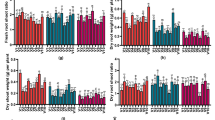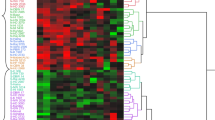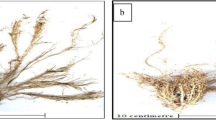Abstract
Heat stress faced by the crop plants at seedling stage hinders its growth and if faced at reproductive stage affects crop production. Globally, maize (Zea mays L.) loses a substantial amount of its production due to very high temperatures at anthesis stage during spring season. So, development of heat tolerant maize cultivars is important for maize breeders. The ability of a plant to tolerate heat stress at seedling and reproductive stage is linked with each other and screening at the seedling stage could accelerate the selection process. In the present study, 50 maize inbred lines were screened for heat tolerance at seedling stage under in vitro conditions. Our results showed that parameters such as root length (RL), shoot length (SL), shoot fresh weight (SFW), shoot dry weight (SDW), root fresh weight (RFW), root dry weight (RDW), leaf area (LA), leaf fresh weight (LFW), leaf dry weight (LDW), relative water content (RWC), membrane stability index (MSI) and total chlorophyll (TCHL) showed a significant decrease under heat stress (p < 0.05). Further, morpho-physiological traits were delineated by principal component analysis (PCA). Hierarchical cluster analysis (HCA) was done with the objective to characterize the maize inbred lines based on their response under heat stress. Among the four column clusters, column cluster I showed highest mean values for maximum traits, i.e., RL (16.45 cm), RFW (0.27 g), SL (28.42 cm), SFW (0.74 g), SDW (63.03 mg), LFW (0.16 g), LDW (20 mg) and RWC (48.63%), suggesting that these traits were superior over other traits and inbred lines falling in this cluster would be selected directly on the basis of these traits. The heat tolerance index (HTI) of all the inbred lines based on individual traits was calculated and inbred lines were ranked accordingly. The top five inbred lines: LM22, CML579, LM13, LM16 and RIL 33 performed best under heat stress as they had high heat tolerance index value. The results obtained by PCA and HCA were in accordance with those obtained on the basis of HTI. Our study identified heat tolerant inbred lines of different heterotic pools which, after field validation, can be used for development of heat tolerant maize hybrids.




Similar content being viewed by others
References
Arnon DI (1949) Copper enzymes isolated chloroplasts, polyphenoloxidase in Beta vulgaris. Plant Physiol 24:1–15
Ayub M, Ashraf MY, Kausar A, Saleem S, Anwar S, Altay V, Ozturk M (2021) Growth and physio-biochemical responses of maize (Zea mays L.) to drought and heat stresses. Plant Biosyst Int J Dealing Asp Plant Biol 2:1–13
Cheema H, Singh B (1991) Software statistical package CPCS-1. Department of Statistics, Punjab Agricultural University Ludhiana
Debnath S, Gazal A, Yadava P, Singh I (2016) Identification of contrasting genotypes under heat stress in maize (Zea mays L.). Maize J 5(1):14–24
El-Sappah AH, Rather SA, Wani SH, Elrys AS, Bilal M, Huang Q, Dar ZA, Elashtokhy MMA, Soaud N, Koul M, Mir RR, Yan K, Li J, El-Tarabily KA, Abbas M (2022) Heat stress-mediated constraints in Maize (Zea mays) production: challenges and solutions. Front in Plant Sci 13:879366
FAO-AMIS (2021) Food and Agricultural Organization of the United Nations—Agricultural market information System. Available online: www.fao.org
Garcıa MPG, Conesa CM, Enguita AL, GonzalezV B, Simancas B, Neila SN, Bermudez MS, Gonzalez IS, Caro E, Castrillo G, Pozo JC (2023) Temperature changes in the root ecosystem affect plant functionality. Plant Commun 4:100514
Khan MI, Kainat Z, Maqbool S, Mehwish A, Ahmad S, Suleman HM, Mahmood Z, Ali M, Aziz A, Rasheed A, Li H (2022) Genome-wide association for heat tolerance at seedling stage in historical spring wheat cultivars. Front Plant Sci 13:972481
Kilasi N L, Singh J, Vallejos C E, Ye C, Jagadish S V K, Kusolwa P and Rathinasabapathi B (2018) Heat stress tolerance in rice (Oryza sativa l.): Identification of quantitative trait loci and candidate genes for seedling growth under heat stress. Front Plant Sci 9:1578.
Li Z, Howell SH (2021) Heat stress responses and thermotolerance in maize. Int J Mol Sci 22(2):948
Li ZG, Ye XY (2022) Transcriptome response of maize (Zea mays L.) seedling to heat stress. Protoplasma 259(2):357–369
Lu L, Liu H, Wu Y, Yan G (2022) Wheat genotypes tolerant to heat at seedling stage tend to be also tolerant at adult stage: the possibility of early selection for heat tolerance breeding. Crop J 10:1006–1013
Müller LLB, Albach DC, Zotz G (2017) ‘Are 3 °C too much?’: Thermal niche breadth in bromeliaceae and global warming. J Ecol 105:507–516
Premchandra GS, Saneoka H, Ogata S (1990a) Cell membrane stability, an indicator of drought tolerance as affected by applied nitrogen in soybean. J Agric Sci Camb 115:63–66
Radford PJ (1967) Growth analysis formulae-their use and abuse 1. Crop Sci 7:171–175
Rai AN, Saini N, Yadav R, Suprasanna P (2020) A potential seedling-stage evaluation method for heat tolerance in Indian mustard (Brassica juncea L. Czern and Coss). 3 Biotech 10(3):114
Schonfeld MH, Johnson RC, Carver BF (1988) Water relations in winter wheat as drought resistance indicators. Crop Sci 29:526–531
Shi J, Yan B, Lou X, Ma H, Ruan S (2017) Comparative transcriptome analysis reveals the transcriptional alterations in heat-resistant and heat-sensitive sweet maize (Zea mays L.) varieties under heat stress. BMC Plant Biol 17:26
Taratima W, Chuanchumkan C, Maneerattanarungroj P, Theerakulpisut P, Dongsansuk A, Trunjaruen A (2022) Effect of heat stress on some physiological and anatomical characteristics of rice (Oryza sativa L.) cv KDML105 callus and seedling. Biology 11(11):1587
Walter A, Studer B, Kolliker R (2012) Advanced phenotyping offers opportunities for improved breeding of forage and turf species. Ann Bot 110:1271–1279
Wang HQ, Liu P, Zhang JW, Zhao B, Ren BZ (2020) Endogenous hormones inhibit differentiation of young ears in maize (Zea mays L.) under heat stress. Front Plant Sci 11:1–15
Wang Q, Xia ZQ, Zhang SB, Fu YF, Zhang GX, Lu HD (2022) Elevated temperature during seedling stage in different maize varities; Effect on seedling growth and leaf physiological characteristics. Russ J Plant Physiol 69:138
WMO (2022) World Meteorological Organization-International organizations. Web archive. Retrieved from the Library of Congress. www.loc.gov/item/lcwaN0010741/.
Wu Q, Wu J, Zheng B, Guo Y (2018) Optimizing soil-coring strategies to quantify root-length-density distribution in field-grown maize: virtual coring trials using 3-D root architecture models. Ann Bot 121(5):809–819
Wu DC, Zhu JF, Shu ZZ, Wang W, Yan C, Xu SB, Wu DX, Wang CY, Dong Z, Sun G (2020) Physiological and transcriptional response to heat stress in heat-resistant and heat-sensitive maize (Zea mays L.) inbred lines at seedling stage. Protoplasma 257:1615–1637
Yadav S, Pavan K, Tiwari Y, Jainender J, Jyothi N (2017) Exogenous application of bio-regulators for alleviation of heat stress in seedlings of maize. J Agric Res 2(3):000137
Yang X, Zhu X, Wei J, Li W, Wang H, Xu Y, Yang Z, Xu C, Li P (2022) Primary root response to combined drought and heat stress is regulated via salicylic acid metabolism in maize. BMC Plant Biol 22:417
Zafar S, Hameed A, Khan S, Ashraf M (2017) Heat shock induced morpho-physiological response in indica rice (Oryza sativa L.) at early seedling stage. Pak J Bot 49:453–463
Zhao C, Liu B, Piao S, Wang X, Lobell DB, Huang Y, Huang M, Yao Y, Bassu S, Ciais P, Durand J, Elliott J, Ewert F, Janssens IA, Li T, Lin E, Liu Q, Martre P, Müller C, Peng S, Peñuelas J, Ruane AC, Wallach D, Wang T, Wu D, Liu Z, Zhu Y, Zhu Z, Asseng S (2017) Temperature increase reduces global yields of major crops in four independent estimates. Proc Natl Acad Sc 114(35):9326–9331
Zhi-qiang TAO, Yuan-quan C, Chao LI, Juan-xiu ZOU, Peng YAN, Shu-fen Y, Xia WU (2016) The causes and impacts for heat stress in spring maize during grain filling in the North China Plain — A review. J Integrative Agric 15(12):2677–2687
Zhou R, Kjaer KH, Rosenqvist E, Yu X, Wu Z, Ottosen CO (2016) Physiological response to heat stress during seedling and anthesis stage in tomato genotypes differing in heat tolerance. J Agron Crop Sci 203(1):68–80
Author information
Authors and Affiliations
Corresponding author
Ethics declarations
Conflict of interest
The author declares that they have no conflict of interest.
Additional information
Communicated by Ágnes Gallé.
Supplementary Information
Below is the link to the electronic supplementary material.
Rights and permissions
Springer Nature or its licensor (e.g. a society or other partner) holds exclusive rights to this article under a publishing agreement with the author(s) or other rightsholder(s); author self-archiving of the accepted manuscript version of this article is solely governed by the terms of such publishing agreement and applicable law.
About this article
Cite this article
Kaur, J., Ghai, N., Chahal, G.K. et al. Characterization of maize inbred lines using principal component and cluster analysis for heat tolerance at the seedling stage under in vitro conditions. CEREAL RESEARCH COMMUNICATIONS (2023). https://doi.org/10.1007/s42976-023-00468-1
Received:
Accepted:
Published:
DOI: https://doi.org/10.1007/s42976-023-00468-1




